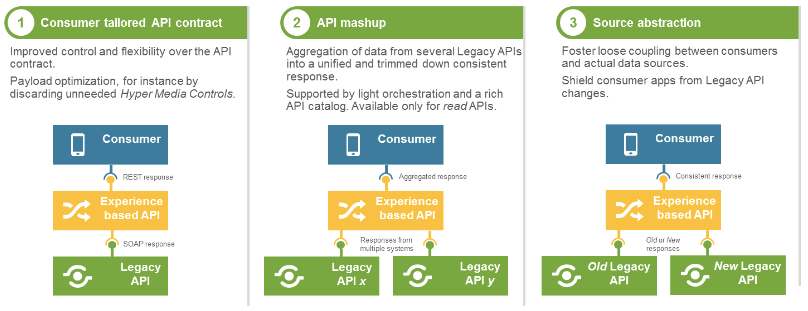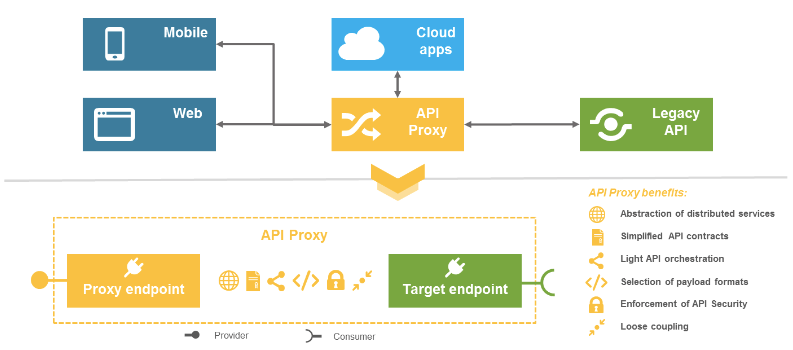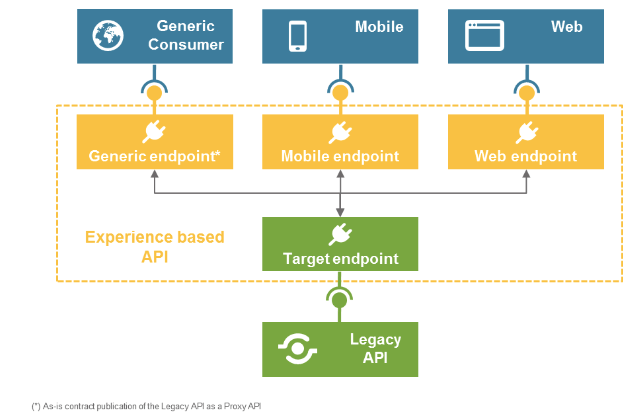Experience-based APIs
As part of any API Management platform rollout project, a new API publication pattern targeting API consumers should be promoted: Experience based APIs. This approach of API integration patterns will become the driver for Self-service API Management, enabling consumer specific API wrappers that are designed and implemented by the consuming teams. In addition to that, this article provides an overview of the pattern, emphasizing the benefits and value created by its adoption.
1. API Proxy is a pattern where façade APIs sit between consumer apps and legacy APIs
Façades and Proxies of API integration patterns are a well-known pattern of Integration Architects with traditional EAI and SOA knowledge. They bring multiple benefits and offer a wide set of capabilities that can enrich the functionality offered by the legacy APIs being proxied.
Typical capabilities supported by API proxies are:
- Light API composition
- Routing
- Message transformation
- Protocol bridging
- API aggregation
- Policy enforcement (security, threat, quotas, etc.)
- Caching
- Mock-up creation
- Canary testing / AB testing
- API anonymization
2. Experience based APIs leverage API Proxies to enable consumer specific API publication
The Proxy pattern can be extended to enable the creation of multiple Proxy endpoints, each one dedicated to a specific API consumer. These new Proxy endpoints will be designed, developed and configured focusing exclusively on the business requirements of their API consumers. Proxy capabilities (transformation, protocol bridging, etc.) can be applied per endpoint, leading to the availability of tailored proxy endpoints which can expose functionality somewhat disparate than the original legacy API.
It is also a good practice to make available a generic “one size fits all” Proxy endpoint to support consumers that need no tailoring of the legacy API business function. Organizations have been successfully exposing and consuming these generic endpoints for a long time, and their immediate decommissioning would not make sense.
There are three key principles that must not be disregarded when implementing the Experience based APIs pattern. Their aim is to ensure maximum value can be derived from the pattern adoption.
- It is important to understand the consumers of an API. Only then a decision can be made if Experience and/or a General-Purpose endpoints are required
- Most APIs are designed by providers and focus on data model purity. Experience based APIs target optimizations and/or performance and not the data model
- Many APIs are designed by API teams having in mind facilitated support. The exposure of Experience based APIs can bring extra complexity to the support processes
3. API Management platforms will promote a shift to an Experience based APIs architecture
- The change drivers
General-Purpose APIs are currently exposed, providing reusable functionality to multiple user-facing applications. However, Desktop, Mobile, Wearables and other devices’ experiences differ drastically – the functionality exposed is also different. Additionally, existing legacy SOAP services are verbose and provide less suitable payload formats - Suited solution
Promote consumer grade Experience based APIs as a core integration pattern, enabling Self-Service API Management, for efficient publication of consumer specific APIs:
– App specific APIs
– Device specific APIs
Self-Service is crucial to the pattern since it empowers API consumers to design, implement and configure their own API Proxy endpoints – API consumers will have full control and ownership of the Proxy endpoints they consume. - Predicted benefits
Contribute to a smoother customer journey and exceptional customer engagement.
Support “Mobile First” strategy, delivering APIs that:
– Require fewer calls – for increased battery life and limited data plans
– Expose less data – for superior app performance
4. Experience based APIs and Self-Service API Management should be encouraged for 3 use cases

Would you like to know more about Experience based APIs, or API integration patterns? We can assist your organization with workshops on the topic. Our consultants have led API Management platform rollout processes in multiple domains and will guide you in the creation of an API center of expertise delivering consumer grade APIs.
API Management blogs, news & cases
- Offer: API Management
- Offer: EAI and API Management
- Whitepaper: The Future of API Management
- Case Study: API Management at Liberty Global Inc.
- Case Study: Eneco: using their API Management Platform the right way
- Blog series: Self-service API Management
- Blog series: Axway API Management
- Blog: API Management Architecture – an introduction
- Blog: Best breed of API Management Platforms



